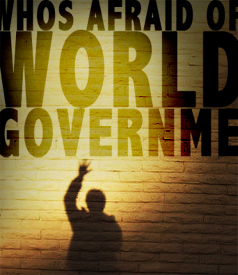A few weeks ago, Glenn Beck of the Fox News Channel, with that hysterical flourish that has made him the darling of right-wing extremists, proclaimed: “America, if . . . you’re not really into that whole One World Government thing, watch out.” This kind of warning, regularly issued on Fox News, seems rather absurd today, given the obvious weakness of the United Nations and the failure of mainstream political figures to even suggest that this international organization might be strengthened to provide more effective world governance.
Nevertheless, not so long ago the idea of world government had greater influence in the United States. Amid the enormous destruction unleashed by World Wars I and II, American presidents successfully championed the establishment of the League of Nations and, later, the United Nations as instruments to curb the narrow nationalism that traditionally had led to war. During the Second World War, especially, an avalanche of books and pamphlets called for new thinking about global governance. Probably the best-known of them was “One World” (1943), a best-seller by Wendell Willkie, the 1940 Republican candidate for president. Serialized or printed in brief versions in more than a hundred newspapers in the United States and Canada, “One World” – within two years of its appearance – sold two million copies in book form.
When the war culminated in the most shocking action yet, the atomic annihilation of Hiroshima and Nagasaki, the world government movement acquired even greater momentum. In early October 1945, twenty prominent Americans – including Supreme Court Justice Owen Roberts, US Senators J. W. Fulbright and Claude Pepper, novelist Thomas Mann and physicist Albert Einstein – called for a “Federal Constitution of the World.” The movement quickly gathered powerful supporters: businessmen such as Owen D. Young, W. T. Holliday and Robert Lund; labor leaders such as Philip Murray and Walter Reuther; university presidents such as Robert Hutchins; magazine editors such as Norman Cousins, and news commentators such as Raymond Gram Swing.
With world government groups springing up across the United States, six of the largest merged in February 1947 to form United World Federalists. By 1949, that organization – dedicated to working “to strengthen the United Nations into a world government” – had 47,000 members in 720 chapters across the nation.
Furthermore, the idea of transforming the United Nations into a world government was endorsed by 45 important national organizations, including the General Federation of Women’s Clubs, the National Grange, the Farmers’ Union, the United Auto Workers, the Junior Chamber of Commerce, the Young Democrats, the Young Republicans and numerous religious bodies. The Communist Party was not among these organizational backers, as the Soviet line of the time was that the world government movement was part of an imperialist plot to invade Communist nations.
Thanks to this broad support, World Government Week was proclaimed in early 1949 by the governors of nine states and by the mayors of approximately fifty US cities and towns. By mid-1949, twenty state legislatures had passed resolutions endorsing world government. That same year, 91 members of the House of Representatives (64 Democrats and 27 Republicans) introduced a resolution to have the House go on record as supporting world federation as a “fundamental objective” of US foreign policy.
This proved the high-water mark of the movement. As the Cold War heightened and as a hot war broke out in Korea, establishing world government began to look increasingly utopian. To the American right, in fact, it looked downright subversive. The House Un-American Activities Committee conducted a grueling investigation of United World Federalists. Seizing the spotlight, Senator Joseph McCarthy and his cohorts repeatedly attacked the “one-worlders.” In 1952, Senator Pat McCarran succeeded in attaching a rider onto federal legislation barring the distribution of funds to federal agencies that promoted “one-world government or one-world citizenship.” A scramble immediately began to remove suspiciously globalist books from the US government’s overseas information centers.
What remains today of the world government movement in the United States is comprised largely of Citizens for Global Solutions, a small organization dedicated to strengthening the United Nations and the scope of international law. Its modest efforts hardly put this unruly planet on the brink of world government, or even provide much of a counterforce to the rabid nationalism peddled by the American right.
But let’s give Glenn Beck and his ilk their due. If there were a more effective global organization, that world body would be able to reach across national boundaries to cope with global warming, defend human rights, prosecute war criminals and terrorists, regulate multinational corporations, provide famine relief, enforce arms control and disarmament, and prevent military aggression. And should patriotic Americans support such practices?
Why not?
Media that fights fascism
Truthout is funded almost entirely by readers — that’s why we can speak truth to power and cut against the mainstream narrative. But independent journalists at Truthout face mounting political repression under Trump.
We rely on your support to survive McCarthyist censorship. Please make a tax-deductible one-time or monthly donation.
